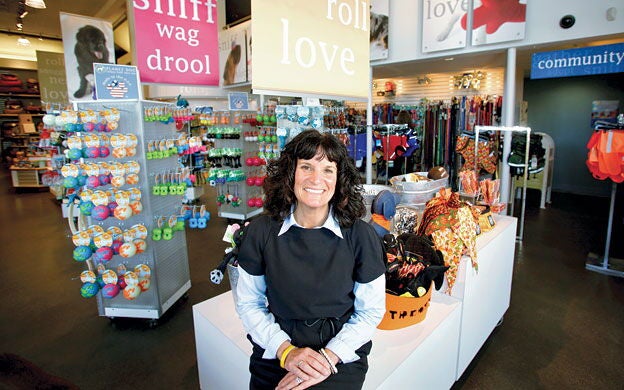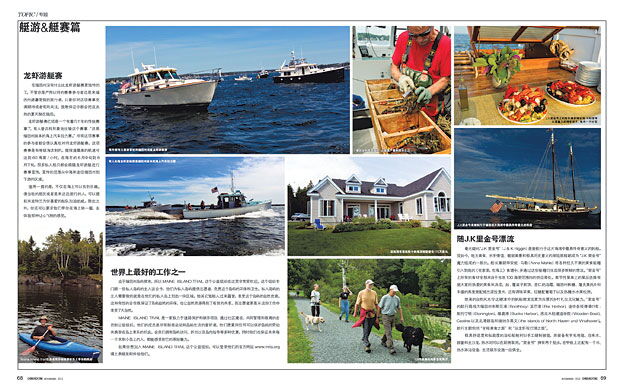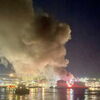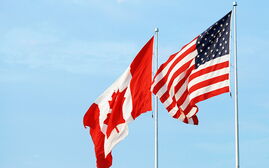ME exporters change tack in marketing abroad
Think marketing in the United States, and a few methods spring immediately to mind: advertising, publicity, social media, and maybe trade or consumer shows. But when marketing to foreign customers, Maine's exporters have to take a broader, more strategic approach: Rather than focusing on which communication tools are best suited to reaching and persuading their products' end-users, exporters are more concerned with establishing and nurturing workable market channels.
Take Stephanie Volo's Planet Dog, for example. The Portland-based manufacturer of accessories for dogs and their owners used to sell directly to pet retailers in Canada. Now, the company relies on a distributor, and in doing so can provide better service to a larger number of Canadian retailers than it ever could have done in-house.
"They know their market so much better," says company partner and co-CEO Volo. "For small companies like us who can't afford to have our own employees in the country, this is what we need."
Educating the market
Selling through foreign distributors works for technical and industrial products, too. Hydro International, with an office in Portland, is a manufacturer of equipment that landowners and governments use to remove sediments, trash, oil and chemicals from stormwater runoff before it can pollute natural water resources or enter the public water supply. The company has been selling through distributors in Australia and New Zealand for about 15 years, according to CEO Steve Hides. Those distributors are largely self-supporting: they understand the products well and know how to sell them in their markets.
The same isn't true, though, for Hydro's distributors in Brazil and Mexico, both of which have been on board for only a year or two. Hides says those companies require more product education and technical support to help them specify the equipment and ensure that installations are engineered properly. On occasion, Hydro personnel will travel to assist foreign distributors in sales or engineering presentations.
But, according to Hides, it's not only the distributors who need education. In many developing countries, local governments and even national regulatory agencies may be relatively unfamiliar with stormwater treatment. That's the case in Dubai, Qatar, and China, all of which Hides views as markets with strong potential for future sales because of their emerging concern with water resource protection.
"We have a lot of educating to do," he says. "Part of the education process is making people aware there are ways to treat water that are straightforward and not expensive. We participate in the international trade shows, give technical papers and participate in technical conferences around the world on a regular basis."
Finding, working with distributors
Planet Dog also does "everything we possibly can to help our distributors sell our product," according to Volo, but since hers are consumer products, the support efforts differ considerably from Hydro's. Foreign distributors are given prominence on Planet Dog's website and Facebook pages and free fixtures and signage with every order. The company attends international trade shows with its distributors and conducts product training several times each year, either face-to-face or on Skype. The objective, says Volo, is for the distributor to be not only knowledgeable about the products and how to sell them, but enthusiastic about the company and its mission.
Other Maine-based exporters use international trade shows to find foreign distributors. Sabre Yachts of Raymond will soon exhibit at the Shanghai Boat Show with that very objective according to Tony Kieffer, a partner at MaineAsia, a Portland-based consulting firm that is helping Sabre to enter that huge and complex market.
Choosing a foreign distributor is a delicate process, Kieffer says, and finding the right one is particularly important in China. Exhibiting at trade shows, he says, can be like "casting a net: you'll get all kinds of things in the net," and it takes time, energy and discrimination to sort through the catch and understand the value of what's there. "So many American companies who have gone in didn't do China right, spending a lot without good results because they didn't understand the market or have the right partners."
To avoid this pitfall, Kieffer says, Sabre is taking a "staged approach" to finding the right distributor — one that can sell product and provide the levels of service and maintenance befitting a complex, high-ticket product like a yacht. So long before the Shanghai Boat Show, MaineAsia helped Sabre secure publicity in China's major luxury lifestyle and boating magazines. With this in place, Sabre won't appear at the show as just another foreign boatbuilder seeking distribution in China, but one with name recognition and credibility.
Help from MITC
In seeking United Kingdom distribution, Planet Dog took the cautious approach advocated by Kieffer, but still ran into trouble. With the help of the Maine International Trade Center, the company identified several distributors that appeared to be a good match and set up meetings with 10 of them. According to Volo, each distributor was asked to complete a probing questionnaire to assess their ability to market Planet Dog's products and champion its brand and values of social responsibility and philanthropy. Even after this rigorous selection process, the distributor the company chose went bankrupt, causing Planet Dog to lose control of tens of thousands of dollars of unpaid inventory and receivables.
Volo blames the general economy for the trouble, not the distributor or MITC, but the incident still highlights the need for discretion in choosing a distributor, and for maintaining a close, revealing relationship with it to stay abreast of potential trouble.
MITC, in fact, received rave reviews from every exporting company Mainebiz spoke with. With headquarters in Portland and a regional office in Bangor, the organization is "a public-private partnership…funded through the Maine Department of Economic and Community Development and membership dues of nearly 300 businesses, as well as corporate sponsor contributions," according to its 2012 annual report.
Among MITC's best-known activities is the assistance it gives to Maine-based exporters to participate in several international trade shows each year. In November, it helped Maine companies exhibit at Medica, the world's largest medical products trade show, held annually in Dusseldorf, Germany. In January, it organized an exhibit at a seafood products show in California, where four Maine companies did well with Asian buyers, according to MITC Vice President Wade Merritt.
Exporters can sell direct to retailers, "if you have big enough volume or multiple lines," says MITC President Janine Cary, but she recommends caution. It's essential to have a detailed understanding of the importing country's import regulations, customs procedures, product certification, packaging and labeling requirements. Especially when exporting food or agricultural products, the barriers can be complex and daunting.
"I suggest meeting with a couple target retailers and with import agents," says Cary. "You don't necessarily know which avenue to pursue and you should learn both channels. Particularly if you're going direct, there are a lot of regulatory requirements you have to meet. It's important to do your homework, so that by the time you sit down with a retail buyer, you're well prepared."
MITC has helped some Maine companies by putting them in touch with the Foreign Agricultural Service of the U.S. Department of Agriculture, which has offices in some U.S. embassies abroad. These offices help identify potential customers, and assist exporters in complying with local food import regulations. The process has led to direct sales of Maine seafood to major U.K. retailers. Cary also cites Food Export Northeast, a nonprofit trade organization that works with the Foreign Agricultural Service, as another valuable resource.
But it's often best to gain the expertise to sell direct to retailers over an extended period, says Cary.
"I don't recommend going direct to retail first off," she says. "It generally helps if you have a local partner: an agent, a distributor or a trading company. They know the process, and a good one will prepare you for it."
Trade missions
MITC received a great deal of attention in September for organizing a mission to China, led by Gov. Paul LePage.
"The Chinese are very conscious of the pomp and circumstance," says Dennis Leiner, chief technical officer of Lighthouse Imaging, a Portland optical engineering and test equipment firm that participated in the trip. "Having the MITC invite the Chinese FDA officer and having the governor there were actually very useful."
"The trade show model is pretty straightforward," says MITC's Merritt. Trade missions, in contrast, "involve a lot more preparation with the companies, getting them ready, getting their marketing materials in shape, setting up meetings with buyers who already know what they have to offer."
That prep work apparently pays off. According to MITC, the State of Maine Trade Mission to China involved 14 Maine entities, which met with 77 pre-screened business prospects and generated near-term sales of $2.5 million and established connections with Chinese buyers, distributors and regulatory agencies.
The companies that MITC assists, says Merritt, are often inexperienced in exporting and unready to participate in foreign trade shows or missions, lacking price points, logos and adequate collateral materials in English (much less in other languages). MITC helps them with these details, and works to focus them on more important, strategic issues.
"Many of the companies don't know what they need to be doing when they're over there, knowing what they're after, which would seem to be a pretty obvious first step. You need to have a better sense of yourself where you're going to tackle a market like China," says Merritt. "International trade is not for wimps."
Through Customs to customers
No wimp is Carl Spang, president of Falcon Performance Footwear in Auburn and another advocate of MITC.
"Once we've identified an area that looks promising, MITC helps us determine if we really want to make an investment in that area," he says. "They help us understand the cost of exporting into those markets and the mechanisms, taxes required, etc. Then we use MITC to understand who to talk to in order to establish a presence in that market."
Falcon's international marketing took an unusual turn. The company manufactures high-end work boots engineered for demanding industries such as chemicals processing and mining. The boots are expensive, listing at over $200, but some employers offer their employees generous stipends toward the purchase of personal safety gear to comply with stringent safety codes for certain industries in certain countries. This is especially the case with the mining industry in the U.S. and Canada.
Two factors prevent Falcon from using a standard retail distribution model. Mines in Canada tend to be in remote areas that are not served by bricks-and-mortar shoe stores. And Falcon builds each work boot to order. So the company typically sells its boots on the Internet.
Falcon approached Agrium, a large Canadian mine owner, with an innovative proposal: Direct your employees to our website. The employee will order specialized mining boots, specifying size, width and any necessary customization, such as orthotics. To complete the purchase, the employee will enter the company's coupon code and will be personally responsible only for shipping and handling charges. Falcon will ship the boots direct to the employee and, once a month, will bill the mine owner for the boots shipped.
Agrium bought into the system for one of its mines in Saskatchewan. Problems arose almost immediately, in the form of provincial sales taxes and federal import duties payable by the employees before they could take delivery of the boots. The miners hadn't expected these charges, and UPS demanded an insupportably high fee to handle customs clearance, says Spang.
Seeking advice, Falcon turned to MITC, which discovered a workable solution by identifying a clearinghouse to accept the shipments. Now UPS delivers the boots to the clearinghouse, which pays the provincial sales tax and customs duty, processing the customs clearance for about a third of what UPS charged. The clearinghouse bills Agrium for the tax and duties, and delivers the packages to the mine, where the miners pick them up. The new system works smoothly, according to Spang, so that Agrium has expanded it into a second mine, with plans for a third and good prospects for a total of seven mines eventually.
Setting the standard
In 2006, the Chinese federal drug administration (known by the acronym SFDA) was interested in establishing standards for the country's growing medical endoscope manufacturing sector. Seeking guidance, the agency contacted Lighthouse Imaging more or less out of the blue — possibly finding it on the Internet, according to CTO Leiner. On Leiner's first trip to China, the SFDA introduced him to the country's third-largest medical endoscope manufacturer, Zhejiang Tiansong Medical Instrument Co., and encouraged them to do business. (The company's Tian Song brand has since grown to become China's largest, according to Leiner.) Other customers followed suit, so that Lighthouse now sells to three of China's four largest endoscope manufacturers.
"We work closely with the SFDA to make sure our test equipment is noticed," says Leiner. And unlike some sales presentations, this is no mere dog and pony show. For Lighthouse, getting noticed by one of the world's most important medical regulatory agencies involves participating at a high technical level with the ANSI-affiliated professional organization that sets U.S. standards for endoscopes; taking those standards to China and lobbying for their adoption there; then championing both the U.S. and Chinese standards at the international level with the ISO. Following that program, Leiner ensures that endoscopes manufactured by Chinese companies with the help of Lighthouse test equipment can be sold on the international market.
Bringing the mountain to Mohammed
Communication is the foundation of any good marketing strategy, but there are more than just language barriers. Suzanne Fox, principal of Fox Intercultural Consulting in Portland, helps schools in New England market themselves to students from China, and is among the few Mainers outside of the tourism industry marketing directly to foreign consumers.
Social media, she says, is a key strategy for direct-to-consumer marketing in China.
"Everyone's on social and using their mobile phones as an important source of media and input," she says. But being on Facebook and YouTube just won't cut it.
"All our popular social media are blocked in China, but China has its own equivalents," she says. "You need to know how these work."
Spang and Leiner often depend on face-to-face meetings for sales, but going "there" isn't always the best way to introduce your company and your product or service to a foreign buyer. Working on behalf of five Maine boatbuilding companies (Morris Yachts, Hinckley, Hodgdon, Sabre and its sister company, Back Bay) MaineAsia put together a kind of trade mission in reverse, bringing key Chinese boating and lifestyle media to Maine for a five-day junket that included visits to manufacturing facilities and extensive boat testing and cruising with stops at yacht clubs, shoreside restaurants and other sites characteristic of Maine-style yachting.
Why the elaborate stage-setting? According to MaineAsia's Tony Kieffer, the Chinese yacht market is dominated by Euro-styled boats produced by the European builders who got there first, and the Maine boatbuilding tradition and style are entirely unknown. As MaineAsia continues to work closely with Sabre, Kieffer's further explanation focused on that company: "Our strategy was to try to brand and build awareness of Sabre in terms of the Down East tradition: history, Maine as a cruising destination, and the nautical way of life for North America and the world."
A challenging goal, to be sure, but the effort was successful. Two of China's most influential yachting magazines devoted 16 pages to the experience and the boats, and both Sabre and Morris were named "best of the best" in Hurun Report — China's equivalent of the Robb Report and Forbes put together. The exposure is expected to benefit Sabre when it seeks a distributor at the Shanghai Boat Show this month.
Bob Holtzman, a writer based in Rockport, can be reached at editorial@mainebiz.biz.
Read more
















Comments